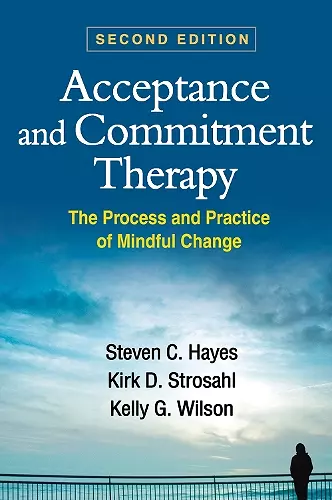Acceptance and Commitment Therapy, Second Edition
The Process and Practice of Mindful Change
Steven C Hayes author Kirk D Strosahl author Kelly G Wilson author
Format:Hardback
Publisher:Guilford Publications
Published:11th Nov '11
Currently unavailable, and unfortunately no date known when it will be back
This hardback is available in another edition too:
- Paperback£43.99(9781462528943)

Since the original publication of this seminal work, acceptance and commitment therapy (ACT) has come into its own as a widely practiced approach to helping people change. This book provides the definitive statement of ACT—from conceptual and empirical foundations to clinical techniques—written by its originators. ACT is based on the idea that psychological rigidity is a root cause of a wide range of clinical problems. The authors describe effective, innovative ways to cultivate psychological flexibility by detecting and targeting six key processes: defusion, acceptance, attention to the present moment, self-awareness, values, and committed action. Sample therapeutic exercises and patient–therapist dialogues are integrated throughout.
New to This Edition
*Reflects tremendous advances in ACT clinical applications, theory building, and research.
*Psychological flexibility is now the central organizing focus.
*Expanded coverage of mindfulness, the therapeutic relationship, relational learning, and case formulation.
*Restructured to be more clinician friendly and accessible; focuses on the moment-by-moment process of therapy.
"A 'must read' for everyone in the field of psychotherapy or behavior therapy, as well as students entering the profession. The significantly revised second edition reviews the growing body of research support for ACT and presents new developments in case conceptualization and treatment implementation."--David H. Barlow, PhD, ABPP, Professor Emeritus of Psychology and Psychiatry and Founder, Center for Anxiety and Related Disorders, Boston University
"Acceptance and Commitment Therapy, Second Edition, presents new data and clinical insights and expresses the theoretical foundations of ACT in a fresh way. The original book was an extraordinary achievement; the second edition is even better. It shows exactly how basic science and therapeutic application can combine in the service of new and effective methods to alleviate suffering. This book is essential reading for all students and practitioners in clinical psychology, counseling, and psychiatry."--Mark Williams, DPhil, Emeritus Professor of Clinical Psychology, University of Oxford, United Kingdom
"Presents an influential approach to helping clients accept their thoughts and feelings and overcome experiential avoidance....The authors delineate a solid clinical rationale and provide clear guidelines for ACT implementation. A real strength of this book is the chapters on each stage of treatment, which detail a wealth of strategies and interventions and include excellent exercises, therapist-client dialogues, and pointers for practice."--Leslie S. Greenberg, PhD, Distinguished Research Professor Emeritus of Psychology, York University, Canada
"In the dynamic field of mindfulness-based therapies, this impressive book is a landmark contribution. The authors offer a sophisticated and wise approach to human transformation, one that has been validated by clinical research and honed by a wide range of clinical applications. This second edition is ideally suited for graduate-level courses in psychotherapy as well as for mental health practitioners. It offers a balance of rich theoretical context and clear, accessible guidance for applying ACT to a range of emotional and behavioral difficulties."--Tara Brach, PhD, author of Radical Acceptance
"This second edition is perfectly timed, given the explosion of developments in the underlying theoretical principles and empirical research associated with this approach to treatment. The book is beautifully written and is an outstanding resource for clinicians and researchers alike, whether novice or experienced. The principles of functional contextualism and relational frame theory are laid out in an easily understandable yet in-depth manner. The book's presentation of the core principles of ACT--including practical guidance for implementing them in clinical practice--is simply superb. This is an excellent text for graduate students in clinical psychology."--Michelle G. Craske, PhD, Professor and Vice Chair of Psychology and Director, Anxiety Disorders Research Center, University of California, Los Angeles -
ISBN: 9781609189624
Dimensions: unknown
Weight: 800g
402 pages
2nd edition